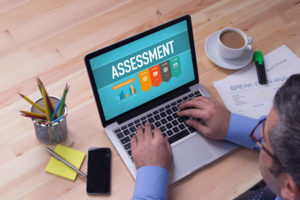Assessments are more than just measuring how well students are doing in particular subjects in school, and they can actually improve student learning. In fact, frequent assessments can have a positive impact on a student’s education from kindergarten through college. While this may make some educators cringe, the reality is that test-enhanced learning, or testing as an aid to learning, has evidence of effectiveness dating back nearly 100 years (Roediger III, McDaniel, & McDermott, 2006).
Testing can help students better retain and recall what they studied, not only for the final exam, but as part of their overall educational development. This is the “testing effect,” or the phenomenon where taking a quiz can enhance later retention of studied materials, and its effectiveness has been demonstrated many times over. Students who take quizzes shortly after they study show better performance on a final test relative to students who only study without taking a practice quiz, even when no feedback is given on the quiz (Roediger III, McDaniel, & McDermott, 2006).
The testing effect, also known as retrieval practice, practice testing, or test-enhanced learning, needs a place in today’s modern learning. It can be implemented in modern learning management system (LMS) and assessment management system (AMS) technologies, like Gauge, to help improve student learning, from their first day in kindergarten to their last day of earning a university degree.
The Testing Effect and LMS Technology
Researchers from the University of Delaware tested the impact of enabling quizzes through LMSs in a series of university-level courses. The university used Canvas, an LMS in the K12 and higher education space, in an effort to enhance student learning by simultaneously decreasing their anxiety and increasing retention of important material. Testing the use of Canvas quizzes in seven online courses and five hybrid courses, the researchers designed quizzes for each student and for each quiz attempt.
Through this study, the researchers found that students who used the quizzes on Canvas:
- Improved their metacognitive accuracy though multiple quiz attempts and earned higher scores on subsequent attempts
- Invested additional time between quiz attempts to better master the assigned materials
- Reduced test anxiety and stress by being able to choose the place and time of taking the quiz
As this study shows, LMS platforms, combined with quizzes, can help students achieve. Though the positive impacts of quizzing have already been established over decades of research, the benefits can be even further improved with the enabling features and settings of modern educational technology.
Quizzing in LMS’ to Improve Student Learning
Though quizzing using available edtech platforms clearly gives students an advantage, there are specific ways to deliver quizzes that can better optimize the experience.
Timing
The longer the delay after learning a subject, the worse students will perform on quizzes. Giving a quiz immediately after learning new materials can halt the forgetting process and improve comprehension, which ultimately boosts final test performance (Spitzer, 1939, Roediger III & Karpick, 2006; Agarwal, Karpicke, Kang, Roediger, & McDermott, 2008; Chan, McDermott, & Roediger, 2006). With LMS platforms set up for immediate administration of quizzes, students can have quizzes available to them directly after they consume course content.
Quizzes in Reading Materials
Compelling research shows that following up text reading with quiz questions improves comprehension, retention and final test performance, more so than questions that appear in advance of materials or interspersed throughout the materials (Chan, McDermott, & Roediger, 2006). Educators can require students to access material and then take short comprehension check quizzes on the LMS of choice.
Fill-in-the-Blank Questions
Students who answer fill-in-the-blank or short answer questions instead of multiple choice scantrons are better able to retain materials over the long-term and master topics come final test time (Glover, 1989; Kang, McDermott, & Roediger, 2007). Instead of creating simple bubble quizzes, educators can design short-answer quiz questions. Using their LMS, they can also be notified when students complete a quiz and require feedback on answers.
Frequency
Giving even one quiz in class can produce significant gains relative to giving no quizzes at all. Administering frequent short quizzes only improves learning more (Bangert-Drowns, Kulik & Kulik, 1991). Educators can make in-class quizzes easier by allowing students to use their mobile device or laptop to access the LMS platform to quickly complete quizzes.
There are many advantages to leveraging educational technology, and educators can particularly use it to enhance the quizzing experience for their students. By augmenting the “testing effect,” learning can not only be assessed, but improved in the K-12 and higher education spaces.
- How we connect incoming students to the university resources they need - July 4, 2025
- AI and the workforce: Reskill to meet the moment - July 1, 2025
- Beyond the game: Why business expertise is the future of sports management - June 26, 2025
